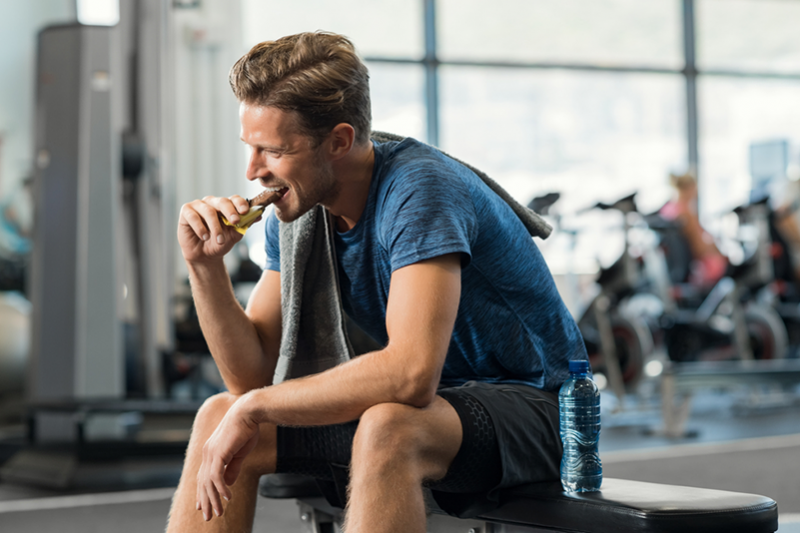Expert advice
Too skinny? Here`s what you should eat after workout

If you’re eating a healthy diet and getting enough calories to support your activity level, you can probably rely on your own appetite, energy levels and experience to tell you whether you need to eat anything before or after exercise and what it should be. The basic rule here is: find out what works best for you, and do that.
There are some advantages to knowing how your body works and what it needs to perform at its best. The bottom line for healthy weight loss and fitness sounds simple: you have to eat fewer calories than you use up—but not fewer than your body needs to function at its best.
The size, timing and content of your pre- and post-exercise meals and snacks can play an important role in your energy levels during your workout, how well your body recovers and rebuilds after exercise and whether the calories you eat will be used as fuel or stored as fat. Here’s what you need to eat and drink to get the results you want.
Your Post-Exercise Fluid Needs
Most moderate exercisers will lose about four cups of fluid per hour of exercise, so try to drink about 0,5 liters of water shortly after your workout to aid the recovery process. If you sweat a lot or the weather is hot and/or humid, consider weighing yourself before and after exercise, and drinking a milliliter of water for every gram of weight you've lost. Because heavy sweating also causes loss of minerals and electrolytes, consider using a sports drink with electrolytes if you need to replace more than two or three cups of fluid.
Your Post-Exercise Meal or Snack
As long as you’re staying within your overall range for the day, you don’t need to be obsessive about matching the following calorie and nutrient ratios perfectly. Just be careful not to fall into the very common trap of thinking that it’s okay to eat anything and everything in sight because you just worked out. Many people are very hungry after a workout, making it easy to eat more than you really need or to choose foods that won’t really help your body. Eating too much of the wrong thing can cause your body to store that food as fat instead of using your post-workout meal to refuel and repair your muscles.
So what does the ideal meal or snack look like?
Calories. Ideally, try to eat enough calories to equal 50 percent of what you burned during your workout. So if you burn about 600 calories, try to eat 300 calories after exercise.
Don’t worry about undoing the calorie-burning benefits of your workout—that’s not how weight loss works. As long as you're eating within your recommended calorie range (whether for weight loss or maintenance), you'll be on your way to reaching your goals.
Carbohydrates. Roughly 60 percent of the calories you eat at this time should come from carbohydrates. Contrary to popular belief, your body needs more carbohydrates than protein after a workout, to replace depleted muscle fuel (glycogen) and to prepare for your next exercise session. Moderate exercisers need about 30-40 grams of carbohydrates after an hour of exercise, but high-intensity exercisers need around 50-60 grams for each hour they exercised.
If you have some favorite high-carb foods that are lacking the whole grains and fiber that are often recommended as part of a healthy diet, this is a good time to have them. Your body can digest refined carbohydrates faster during your "refueling window," but if you prefer whole foods, don’t force yourself to eat processed foods.
Protein. While carbs are essential, it’s also important to include some high-quality protein in your post-workout meal or snack. This protein will stop your body from breaking down muscle tissue for energy and initiate the process of rebuilding and repairing your muscles. About 25 percent of the calories you eat after a workout should come from protein—that's about 10-15 grams for most people.
Fat. Fat doesn't play a big role in post-workout recovery, and eating too much fat after a workout won't help your weight control or fitness endeavors. Only 15 percent (or less) of your post-workout calories should come from fat—that's less than 10 grams. The ideal time to eat after a workout is within 30 minutes to two hours, when your body is ready and waiting to top off its fuel tanks to prepare for your next session.
But if your appetite or schedule doesn’t allow you to eat a meal right after exercise, don’t panic. Your body can still replace your muscle fuel over the next 24 hours, as long as you’re eating enough food to support your activity level. Try to have a smaller snack that contains carbs and protein as soon after exercise as possible. Liquids like smoothies, shakes or chocolate milk, and/or energy bars, can be especially effective post-workout snacks.
As a moderate exerciser, you have a lot of flexibility when it comes to timing your meals and choosing your foods. The most important thing is getting to know your body and how it responds to exercise, so you can give it what it needs to perform at its best. Eating the right things at the right times after you work out is essential to keeping your energy up, your workout performance high and your body in fat-burning mode.



